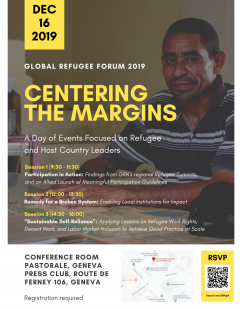A roundtable organized by IDRC, Asylum Access and LERRN
The Geneva Press Club
Monday, 16 December 2019
11h30 to 13h00
Lunch to follow
Purpose
On the eve of the Global Refugee Forum (GRF), the purpose of this roundtable is to make progress in commitments to localization, stemming both from the World Humanitarian Summit and as detailed in the Global Compact on Refugees. While there remains a commitment to work more substantively through local actors – national NGOs, refugee-led organizations, and national academics – significant barriers remain. What is localization? Why is it valuable, effective and important? And how can localization be enhanced through practical steps to improve the efficiency, effectiveness, and impact of refugee responses in the global South, which hosts 80% of the world’s refugees?
Participants
To answer these questions, this workshop brings together a critical group of actors who have experience in the challenges and opportunities that derive from localization, speaking from the perspective of donors, an international NGO, a national NGO, academics based in major refugee-hosting states and refugee-led organizations:
· Anna Crowley, Division Director, Open Society Foundations (TBC)
· Roula El-Rifai, Senior Program Specialist, International Development Research Centre, Canada
· Mozghan Moarefizadeh, Executive Director, RAIC Indonesia
· Janemary Ruhundwa, Executive Director, Dignity Kwanza, Tanzania
· Maha Shuayb, Director, Centre for Lebanese Studies, Lebanese American University
· Naiyana Thanawattho, Executive Director, Asylum Access, Thailand
· Jessie Thomson, Vice President, Partnerships for Global Change, CARE Canada (moderator)
· Pascal Zigashane, Director, URISE for Africa Initiative, Kakuma, Kenya
This event will highlight the significant role local institutions can and do play in realizing localization – a step central to realizing the goals of the GCR. We will illustrate the kinds of partnerships that are needed to enable local institutions to thrive – including by sharing good practices of what local institutions can achieve with reliable support. We will hear from local institutions themselves who are responding to refugee situations daily, and from the global institutions that have supported and enabled them. By highlighting effective partnerships and ongoing challenges, this session will provide a roadmap for enabling localization, revealing immediate protection and long-term solutions for refugees.
Background “Localization” has become a central theme in development and humanitarian policy and practice, especially since the World Humanitarian Summit in 2016. The need to engage host communities, refugee communities, and national actors across the humanitarian and development fields is equally central to the Global Compact on Refugees (GCR), which was affirmed by the UN General Assembly in December 2018. The GCR is premised on the understanding that responses to refugees are best pursued in partnership with host communities and in response to local conditions, opportunities and interests.
These priorities all stress the importance of multi-sectoral approaches to displacement, with responses integrating development, humanitarian and peacebuilding programs. They also highlight the need to situate refugee responses within analysis of local markets and economies, develop programs that benefit refugees and host populations, and relate to host state policies on employment and education. They also speak to the critical importance of building and sustaining political will in support of lasting and rights-based solutions, and the need for responses to account for social and cultural realities.
As argued by Asylum Access in their report on National Governance Frameworks for Refugees, refugees and the local civil society organizations that support their inclusion are among the key actors that can inform and advise host country policy. Refugee voices combined with knowledgeable, connected and locally-led NGOs are uniquely positioned to provide host governments with technical assistance on legislation, argue persuasively for policy reform based on evidence and practices, and bring refugee voices to the table. Currently, such groups are totally under-utilized. Greater funding and participation for locally-led advocacy organizations and refugee representation will help achieve more effective governance frameworks for refugees.
Likewise, localized knowledge and sustained research capacity in regions of refugee origin is a vitally important foundation for such localized responses to displacement, yet it is critically under-supported and often lacking in capacity in key refugee-hosting regions. While 80% of the world’s refugees remain in their regions of origin in the global South, well over 85% of published academic research on refugees and forced migration originates from scholars and research centers in the global North. The concentration of research capacity in the global North perpetuates this trend, while support for research centres in refugee-hosting regions in the global South has largely been crisis-driven and unsustainable.
More localized research and engagement on refugee issues can contribute to more effective policy and practice, especially given the complex dynamics of displacement in fragile contexts and the need to integrate refugee responses into local, national and regional development and peacebuilding strategies. The renewed emphasis on promoting self-reliance for refugee and integrated responses that include the needs of host communities mean that effective responses to refugees require localized and granular understandings of local dynamics, economies, markets and development agendas.
In fact, local institutions are critical contributors to the “whole of society” approach, as articulated in the Global Compact on Refugees. Experts by virtue of their long experience navigating local contexts, there is an overwhelming body of evidence that local institutions instigate positive long-term outcomes for refugees and host communities. However, most local institutions struggle without core funding, causing gaps in response and adding weight to host governments. In contrast, the vast majority of published research on refugees comes from academic institutions in the north, despite the interest and deep knowledge of local researchers, who also struggle to secure funding and staffing.
If we are to truly prioritize the long-term well-being of refugees, we need a radical shift toward the support of local institutions. The goal of this roundtable is to map how that shift can happen.
